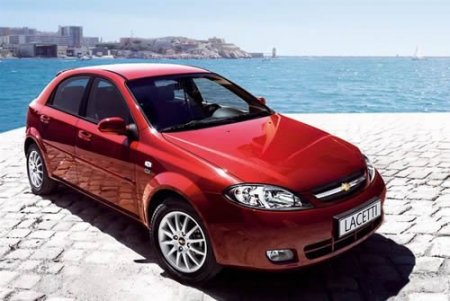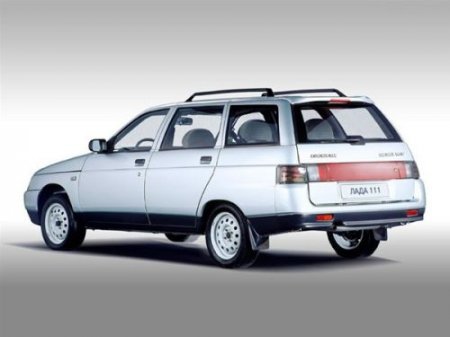
Chevrolet Lacetti in detail about fuel consumption
Content
The Chevrolet Lacetti first saw the light of day in 2003. Released in South Korea, it replaced the Daewoo Nubira and, thanks to the excellent combination of price and quality, immediately showed a high sales rating. Stylish design, cheap maintenance, fuel consumption Chevrolet Lacetti - these and many other advantages brought him to a leading position among other C-class cars. By the way, Italian designers successfully worked on the exterior of the car, so even today it looks quite modern.

Chevrolet Lacetti engine modifications
This model is presented in three types of body:
- sedan;
- hatchback;
- station wagon;
| Engine | Consumption (city) | Consumption (track) | Consumption (mixed cycle) |
| 1.4 Ecotec (gasoline) 5-mech | Xnumx l / xnumx km | 5.9 l / 100 km | Xnumx l / xnumx km |
1.6 Ecotec (gasoline) 5-mech | Xnumx l / xnumx km | 6 l / 100 km | 7 l / 100 km |
1.8 Ecotec (gasoline) 4-auto | Xnumx l / xnumx km | 7 l / 100 km | 9 l / 100 km |
2.0 D (diesel) 5-mech | Xnumx l / xnumx km | 4.8 l / 100 km | 5.7 l / 100 km |
The engines are available in three versions with manual and automatic transmissions.
Modification 1,4 mt
Such the car is equipped with a 1,4 liter engine, the smallest volume of this line of machines. With a power of 94 horsepower, it reaches speeds of up to 175 km / h and is equipped with a five-speed manual transmission.
Fuel consumption on a Chevrolet Lacetti with an engine capacity of 1,4 liters for a hatchback and a sedan is the same. He is 9,3 liters per 100 km for the urban cycle and 5,9 liters for the suburban. The most economical urban option pleases its owners not only with fuel consumption, but also with comfortable driving conditions.
Modification 1,6 mt
Fuel consumption on the Lacetti with a 1,6-liter engine depends on the type of body. Engines of this size are supplemented with an injector and were produced until 2010. Such sedans and hatchbacks reached speeds of up to 187 km / h with a maximum power of 109 horsepower. The car was produced with a five-speed mechanics.
The average fuel consumption of the Lacetti Hatchback in the city is 9,1 liters per 100 km, the same figure for the sedan. But the station wagon in the same urban cycle “winds” already 10,2 liters.

Modification 1,6 at
Similar in power, but with a 4-speed automatic transmission, the car won its fans with reliability and durability. Despite the fact that the automatic transmission is rather capricious, the car does not need frequent maintenance. The fuel consumption figures declared by the manufacturer on it are the same as in the version with manual transmission. The Chevrolet Lacetti's fuel consumption rate on the highway is 6 liters per 100 kilometers.
Modification 1,8 at
The most powerful version of the car has 122 horsepower, accelerates to 184 km / h and is equipped with a 1,8 liter gasoline engine and an automatic transmission.
Chevrolet's fuel consumption per 100 km will be higher for such models, but it remains the same for all body types. So in in the city, the fuel tank will empty by 9,8 liters per 100 km, and on the highway, consumption will be 6,2 l per hundred.
Modification 1,8 mt
The car is designed for those who are accustomed to completely subjugate the driving process. This Lacetti has the same engine power characteristics and gas mileage, but, interestingly, a car with a manual transmission can reach speeds of up to 195 km / h.
Real consumption and ways to save fuel
This value depends on many factors. Drivers cannot influence such as, for example, city traffic jams, air temperature in winter, road conditions. But there are ways by which the consumption of gasoline by a car can be significantly reduced:
- Style of riding. One of the main factors affecting consumption is experience and driving skills. This is confirmed by reviews that the fuel consumption on a Chevrolet Lacetti (automatic) is slightly higher than on a car of the same power, but with a manual gearbox, where the engine speed is controlled by an experienced driver.
- It is better to refuel the car in the same proven place, because the lower the quality of gasoline, the greater its consumption.
- Low tire pressure increases fuel consumption by more than 3%, so it is important to check the condition of the wheels as often as possible and inflate them regularly.
- Traveling speed. Mercedes-Benz engineers calculated the aerodynamic properties of cars and came to the conclusion that when driving at a speed of more than 80 km / h, the rate of fuel consumption increases sharply.
- The air conditioner and heater affect the flow rate quite strongly. To save fuel, you should not turn on these devices unnecessarily, but it is important to remember that open windows create increased air resistance and lead to high consumption.
- Excess weight. You should not carry unnecessary things in the trunk for a long time that add weight to the car, since more fuel is required to accelerate a heavy body. Gasoline consumption on a Chevrolet Lacetti station wagon will increase by 10-15% with a tightly packed trunk.
- Also, regular visits to the service station will help keep the car in good condition and prevent unnecessary waste of fuel. This will help to appreciate the Chevrolet Lacetti, unique in its class, combining beauty, economy and high quality.

